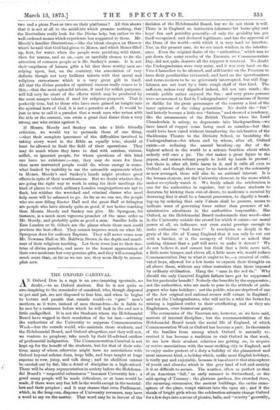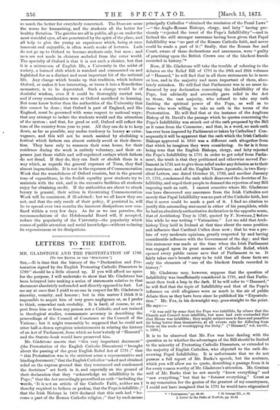THE OXFORD CARNIVAL.
AN Oxford Don in a rage is an awe-inspiring spectacle, no doubt,—to an Oxford student. But he is not quite so awe-inspiring to the remainder of mankind, who, though disposed to pet and pat, are not disposed to fear him, and when he begins to lecture and punish that outside world—to "gate" men's mothers, as it were, instead of men themselves—he is liable to be met by a resistance before which he will look in the end not a little undignified. It is not the Students whom the Hebdomadal Board have wigged in their resolution of the 1st inst.--advisiug the authorities of the University to suppress Commemoration Week—but the outside world, who maintain those students, and the Hebdomadal Board, and Oxford altogether, and they will not, we venture to prophesy, take much by their ill-advised outflow of professorial indignation. The Commemoration Carnival is not kept up for the benefit of the students, but for that of their rela- tives, many of whom otherwise might have no associations with Oxford beyond solemn dons, large bills, and boys taught at huge expense to row, jump, and talk slang ; and its abolition cannot be carried out by fiat, like a detail of discipline in a high-school. There will be sharp argumentation in society before the Hebdoma- dal Board's "respectful submission" becomes University law ; a good many people will be made ridiculous, or at least would be made, if there were any fun left in the world except in the teetotal- lers and their prophet ; and it may chance that even Parliament, which, in the long-run, disposes of University revenues, may have a word to say on the matter. That word may be in favour of the
decision of the Hebdomadal Board, but we do not think it will There is in England an instinctive tolerance for horse-play and boys' fun and geniality generally—if only the geniality has got- itself recognised, and declared legitimate, and has the approval of the Dons of the world—with which it is very hard to interfere. Nor, in the present case, do we see much wisdom in the interfer- ence. Even the original desire of the "authorities," which was to- put down the noisy revelry of the Encomia, or Commemoration Day, did not quite deserve all the support it received. No doubt the Undergraduates were very noisy, and it was very hard on the Vice-Chancellor to be silenced, and still harder on the Proctors to have their peculiarities vivisected, and hard on the speechmakers
and verse-reciters to be so grievously interrupted, but still Eng- lishmen are not hurt by a little rough chaff of that kind. The sufferers, unless very dignified indeed, did not care much ; the outside public rather enjoyed the fun ; and very grave persons were accustomed to find in Undergraduates' expressions of favour or dislike for the great personages of the country a hint of the inner opinions of the rising generation. No doubt the " fun " had latterly become a little too "furious," and showed a tendency, like the amusements of the British Theatre when the Lord Chamberlain is asleep, to degenerate into blackguardism—we have heard of copper coins being used as missiles—but that could have been cured without transferring the celebration of the Sheldonian Theatre to the Divinity School, or banishing the Undergraduates—for whom and by whom, after all, Oxford, exists—or reducing the annual breaking -up day of the highest school in the world to a solemn function about which nobody will care a jot. The riot makes a great figure in the papers, and causes solemn people to hold up hands in protest ; but there is, after all, little harm in it, and it calls all eyes to Oxford; and though there may be no harm at all in the solemnity as now arranged, there will also be no national interest. It is the human element, not the University element, in the scene which makes everybody watch it. We freely admit the celebration is one for the authorities to regulate, but to reduce students 'to- decorum by kicking them out-of-doors, to moderate a carnival by decreeing that it shall be a funeral procession, to dignify a break- ing-up by ordering that only Ushers shall be present, seems to indicate want of governing force rather than presence of ad- ministrative adroitness in the authorities responsible. Has Oxford, as the Hebdomadal Board understands that word—that is, the University outside the crowd for which it exists—no moral power at all, no influence, not even social prestige enough' to- make ruffianism "bad form ?" Is rowdyism so deeply in the grain of the ilite of Young England that it can only be cut out with a hatchet, or is the savagery of Oxford so naked that nothing thinner than a pall will serve to make it decent ? We do not believe it, and cannot but think that a little more tact, a little more temper, and above all, a little more wit, would reduce Commemoration Day to what it ought to be,—a carnival of culti- vated boys, allowed for a few hours to express their thoughts on all above them, without any other restraints than those imposed by ordinary civilisation. Hang the "man in the red tie." Why should the only Carnival English fathers have got be suppressed for his particular benefit? Nobody else benefits by the suppression ; not the authorities, who are made to pose in the attitude of peda- gogues who hate holidays ; not the public, who are deprived of one of the few original and national scenes still extant in England;: and not the Undergraduates, who will not be a whit the better for missing a legalised outlet to their overflowing, and as they are Englishmen, over-boisterous gaiety.
The ceremonies of the Encoenia are, however, as we have said, matters of internal discipline ; but the recommendations of the Hebdomadal Board touch the social life of England, of which Commemoration Week at Oxford has become a part. In thousands of the families from among which Oxford is annually re- cruited it has become a tradition to visit Oxford in that week, to see how their student relatives are getting on, to acquire or revive associations with the most striking city in England, and to enjoy under pretext of a duty a holiday of the pleasantest and most innocent kind, a holiday which, unlike most English holidays,_ is really gay and enjoyable, because it has about it that atmosphere- of youth and abandon which in this grey land of toil and anxiety it is so difficult to secure. The weather, often as perfect as that of an American "fall," an early summer in Switzerland, or the mid-spring of Tuscany ; the glorious gardens, the crowded river, the recurring ceremonies, the ancient buildings, the entire atmo- sphere of the place, tempt visitors into the open air ; and if the shoals of bright girls whom the celebration attracts change Oxford for a few days into a scene of picnics, balls, and " revelry " generally,. so much the better for everybody concerned. The Dons are none the worse for humanising, and the students all the better for healthy flirtation. The gaieties are all in public, all go on under the most watchful eyes, all are penetrated by the spirit of the place, and all help to give the young an experience which, being at once innocent and enjoyable, is often worth weeks of lectures. Lads do not go up to Oxford to become students only, but men ; and men are not made in cloisters secluded from the outer world. The specialty of Oxford is that it is not such a cloister, but that it is a microcosm of English life, a University in the midst of society, a learned club which is watched and commented on and legislated for as a distinct and most important bit of the national life. Any change which breaks up that tradition, which isolates Oxford, or makes it less interesting, or turns it into a Benedictine monastery, is to be deprecated. Such a change would be of doubtful wisdom, even if it could be thoroughly carried out, and if every consideration were at Oxford sacrificed to learning. But none know better than the authorities of the University that this cannot be done ; that Oxford is part of England, and like England, must be governed with some respect to national ways ; that any attempt to isolate the students would end the attraction of the system ; and that, for good or evil, Oxford will reflect the tone of the country from year to year. All they can do is to keep down, as far as possible, any undue tendency to luxury ar extra- vagance, and this will not be much assisted by abolishing a festival which fathers can almost entirely avoid at their discre- tion. They have only to summon their sons home, for their residence during the week is entirely voluntary, and their ex- penses just those visible and self-regulated outlays which fathers do not dread. If they do, they can limit or abolish them in a way which, as regards the general expenses of Term, they find almost impracticable. It is not in the expenses of Commemoration Week that the wastefulness of Oxford consists, but in the general tone of expenditure, in the foolish equality poor students try to maintain with the rich, and in the excessive facilities all students enjoy for obtaining credit. If the authorities are about to attack luxury in general, their action in threatening Commemoration Vtreek will be consistent, if ill-advised ; but we all know they are not, and that the only result of their policy, if persisted in, will be to spread over two months the innocent dissipations DONT con- fined within a very few days. As far as we can perceive, the recommendations of the Hebdomadal Board will, if accepted, reduce the popularity of the University—the popularity which comes of public attention and social knowledge—without reducing its expensiveness or its dissipations.



































 Previous page
Previous page